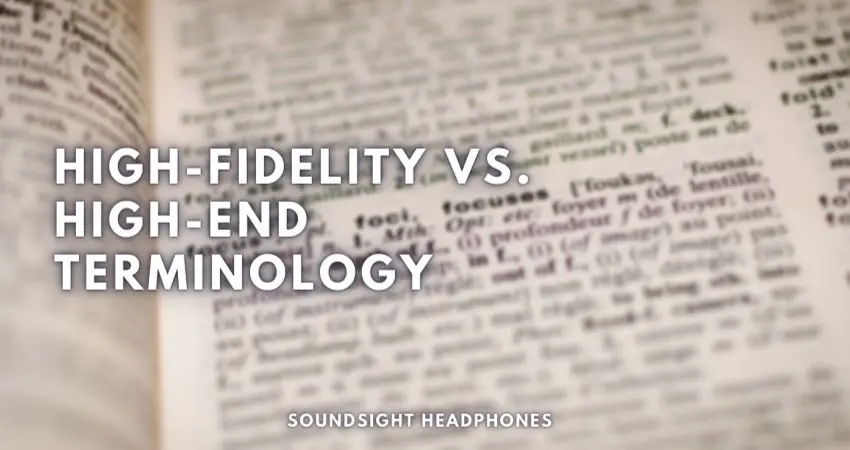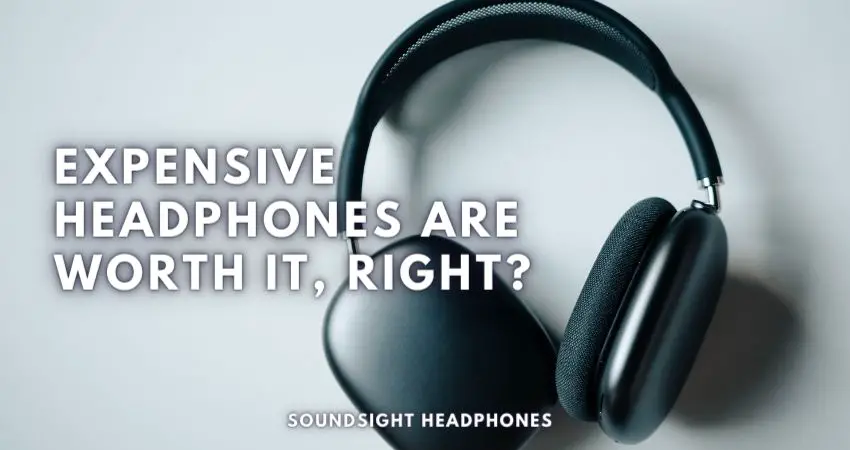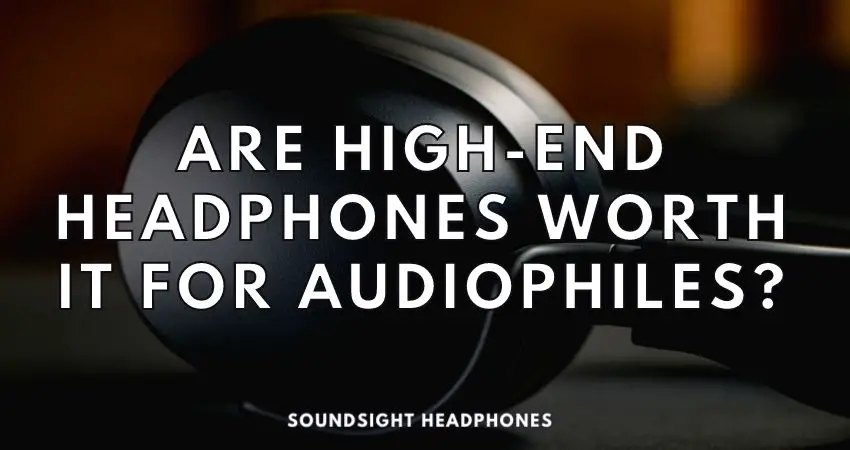The importance and worth of high-end headphones for audiophiles isn’t always clear-cut, even more so if you’re not an audiophile and don’t have a reference point for what’s considered high-end in the Hi-Fi realm.
In this article, we’ll throw light on the question of “whether high-end headphones are worth buying for audiophiles” by going into more detail on the following:
- The variables that determine the value of TOTL (top-of-the-line) headphones
- Explaining the terms high-end and high-fidelity for a clearer understanding of the question
- What is considered high-end, and how are high-end headphones classified
- Frequently answered questions related to the topic
Variables that influence the value of high-end headphones
There are a lot of variables in determining if a set of high-end audiophile-level headphones is worth the money:
- What defines high-end headphones for audiophiles.
- What separates “high-fidelity” from “high-end audiophile headphones.”
- Whether expensive audiophile headphones sound better than cheap ones.
- The audiophile’s financial situation and background.
- The type of user who uses high-end audiophile headphones, whether an ordinary listener or a musician.
- Personal appreciation towards high-fidelity music and ability to discern high fidelity audio.
- Sound fidelity and pricing – How reasonable the price is for high-fidelity headphones.
- The upgrade path and how significant the upgrade is. Do you plan on upgrading a pair of Sennheiser HD 600 to the HD 800 line-up?
- Are they audiophiles who simply enjoy listening to music through Hi-Fi headphones, or audio enthusiasts willing to spend tens of thousands of dollars on high-end headphones?
- How long you listen to music, what type of music you listen to, and the applications of the headphones.

Semantics of high-fidelity vs. high-end in audiophile terms
What do I mean by high-fidelity or high-end headphones, you wonder?
The multidimensional nature of human interaction with sound, the complexity of audio engineering, and the vast range of good-sounding headphones make defining high-end and high-fidelity a complex affair.
Accordingly, we’ll go in-depth on the following:
- What the term “high-end” means
- The difference between high-end headphones and high-fidelity headphones.
What does high-end mean in audiophile terms?
Before we discuss the worth of high-end headphones for audiophiles, it’s important to distinguish what should be included in the “high-end” category.
- The term high-end refers to the highest tier of headphones, which for audiophile models encompasses a wide array of premium, high-class models.
- To describe top-of-the-line headphones with high-fidelity audio, audiophiles have coined a term called “Summit-fi.” Summit-fi headphones are the top-echelon of audiophile headphones that are often priced in the thousands to tens of thousands of dollars.
- A high-end audiophile headphone is also known as a flagship model within a company’s series or line-up of headphones. It’s the headphone representative of the company’s peak performance.
With this in mind, most audiophiles and hi-fi enthusiasts regard the term high-end audiophile headphones as synonymous with “Summit-Fi” headphones, while others call them “End-game headphones”.
High-end headphones are not equivalent to high-fidelity headphones
Now, there are several things we can say about the difference between high-end headphones and high-end audiophile headphones, and why they’re not nearly as indistinguishable as one might think, such as:
- High-end pricing is not a reliable indicator of overall value.
- The scope of the term “high-end headphones” is still obscure and depends mainly on the class of headphones in question.
- The value of high-end headphones varies depending on factors that have little to anything to do with sound quality, such as technology and prestige.
- Headphones sold at exorbitant prices under the label “Summit-Fi” or “Hi-Fi” listed as high-end headphones in order to justify their prices or the use of premium pricing as an indicator of a high-end product.
In general, high-end refers strictly to the top of the range of headphones within a specific market domain, for example, high-end audiophile headphones or studio. These headphones are also the most expensive at the top of the market.
Meanwhile, the term high-fidelity is not restricted to price. It is an umbrella term for headphones that generally use a HIFI standard of music playback.
High-end headphones: A matter of money or sound quality?
The term high-end is a broad class of formal thought, giving the term high-end audiophile headphones a more ambiguous meaning. There’s a hard line drawn in the sand when it comes to what constitutes a high-end audiophile headphone, and that line comes in the form of $1,000.
Now, to what extent is a $1,000 headphone worth to audiophiles? The answer is clear for gravely-minded audiophiles: high-end audiophile headphones north of $1,000 are absolutely worthwhile because they surpass a respectable benchmark from a sound fidelity point of view.
However, plenty of critics uphold that reference headphones like the open-back AKG Q701 and AKG K612 Pro reach high-end audiophile levels of sonic quality for less than $300, without reaching the arbitrary $1,000 mark representative of a high-end audiophile headphone.
Accordingly, the class of the “high-end” is a bit general. Therefore, whether audiophiles find high-end worth buying depends on individual interpretation, rather than on a universally accepted scale of measurement.
You can find a multitude of high-value audiophile headphones in the $300 to $500 range, worthy of the title of “high-end” headphones.

If the headphones are expensive, they must be worth it, right?
Quality costs, so everyone’s first assumption is that expensive headphones must be good, either because you paid a lot of money or some impressive technology must be packed in. Or, perhaps, because you’re buying a product from a company that invested years of research and development, resulting in a good and expensive product.
According to this illusory belief, the following two statements are true:
- Expensive items are high-end
- If something is high-end, it must be expensive.
However, as noted earlier, cheaper reference headphones in their $200 – $300 price bracket can behave as high-end headphones if they have a noteworthy sound quality. The fact that expensive headphones like Sony Z1R have a huge sound response flaw around the 10 kHz frequency mark, also strengthens the argument that “not all headphones costing a premium are worthy of the title.” Particularly when there are other headphones that can provide audiophiles with better value for the money.
Consequently, this line of thinking that expensive equals high-end or high-quality is erroneous and shows how expensive headphones aren’t a safe purchase that absolutely guarantees top-notch quality.
A more subtle difference exists between high-end audiophile headphones costing $1,000 and mid-range Hi-Fi headphones, which begs the question: are diminishing marginal returns worth paying for when it comes to top-of-the-line high-fidelity headphones?
Another related question worth asking is whether audiophiles are willing to pay double or triple the price of mid-fi headphones to achieve a 5% gain in sound quality?
The truth is, unless you’re fully captivated and spellbound by this wallet-draining hobby, expensive headphones are not worth it, not even for audiophiles. You don’t need that small boost in sound quality to achieve audio nirvana. Serious audiophiles have admitted that paying for many over-priced high-end headphones designed for audiophiles isn’t justifiable.
For non-audiophiles, the best value for money is in mid-range audiophiles headphones. That is, mid-fi headphones within easy reach that cost $300 – $400 at maximum. From this perspective, if a person is willing to spend $1,000 on headphones, there’s no need for them to spend more than that.

What makes headphones worth buying for an audiophile?
For audiophilic people, exclusive high-fidelity headphones are a prime concern that feeds their passion for good-sounding music.
Hi-Fi headphones also constitute the substance for audiophiles’ sole hobby, in which money is tirelessly just a tool to buy more headphones.
Interestingly, though, the hallmarks of high-fidelity headphones worthy of audiophile attention are not so puzzling. In fact, they are simple and unequivocal:
- Ultimate sound transparency is quintessential for audiophiles listening experience.
- High sound resolution and precision in details, such as vivid instruments and lifelike vocals.
- Rigorous reproduction of dynamics, frills, and nuances with a faithful and accurate representation of the original recording or live performance.
- Balanced frequency response range that allows the listener to enjoy the uncompromised music with complete confidence in its accuracy.
- Ample soundstage and realistic imaging that allows the listener to enjoy the whole of the music.
These are the main characteristics of audiophile-grade headphones. Accordingly, a good high-end audiophile headphone should combine all these five essential qualities.
Frequently, moderately expensive headphones offer good performance but come with luxurious packaging that makes you regret not the extra quality you could have got if the packaging was normal, like the AKG K612 Pro with its sumptuous, imposing package.
FAQ
Are expensive headphones worth it for the average Joe?
For the general consumer, high-end or premium headphones oriented towards a particular audience (audiophiles, critical listeners, home studio enthusiasts, etc.) are not usually worth it when compared to mid-range audiophile headphones or mainstream headphones.
Buying a pair of “high-end” headphones for the average Joe is justifiable in the event of a huge discount. But in the vast majority of cases, the purchase of expensive headphones is not worth it for the average consumer.
Instead, most consumers should look for highly affordable, good-sounding audiophile headphones.
Should you buy high-end audiophile headphones?
Establishing whether the all-important decision of buying a high-end audiophile headphone is a good idea depends on how worthy and desirable audiophile headphones are for you.
A few considerations are worth keeping in mind:
- How much money are you willing to spend on audiophile headphones?
- How important is it for you to get impeccable sound quality?
- How much freedom of experimentation do you have to try out different headphones?
- When buying audiophile-grade headphones at the top of the market, do you really need to pay more to get a noticeable improvement in sound quality? Or can you settle for cheaper headphones with stellar sound quality without breaking the bank?
What do you get for paying big money for audiophile headphones?
Top-of-the-line audiophile headphones offer excellent sonic performance, a robust build, and a unique design that expresses a sense of individuality. These qualities are important to be aware of when contrasting the quality and value of high-fidelity headphones in the high-end segment to mid-range ones.
Naturally, premium audiophile headphones that cost a lot of money offer sound resolution to a great extent that you start noticing once you’re accustomed to the headphones.
The jump in sound quality from mid-fi to hi-fi headphones isn’t as monumental as you might expect, but you still get a notable improvement in terms of sound resolution, details, transient response, and tonal balance.
The bottom line – are high-end headphones worth it for audiophiles?
Drawing from the fact that audiophiles spend weeks, months, or years in search of that one elusive perfect headphone, it’s clear to see that audiophiles get obsessed about their headphones and will spend a considerable amount of time and money in search of the perfect sound.
To that end, it’s reasonable to conclude that for audiophiles with strong priorities, it’s worth spending several hundred or thousands of dollars on a set of high-end audiophile headphones, even considering the marginal returns compared to more affordable options. If you consider yourself one of them, tell us about your experience in the comments below.
But if you’re an everyday consumer, there’s no need to spend excessive money on high-end headphones, not when numerous highly affordable good-sounding audiophile headphones are out there.
